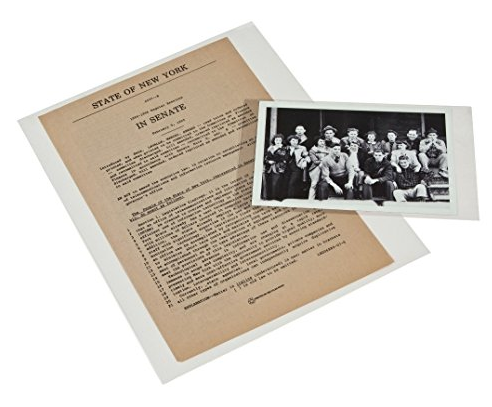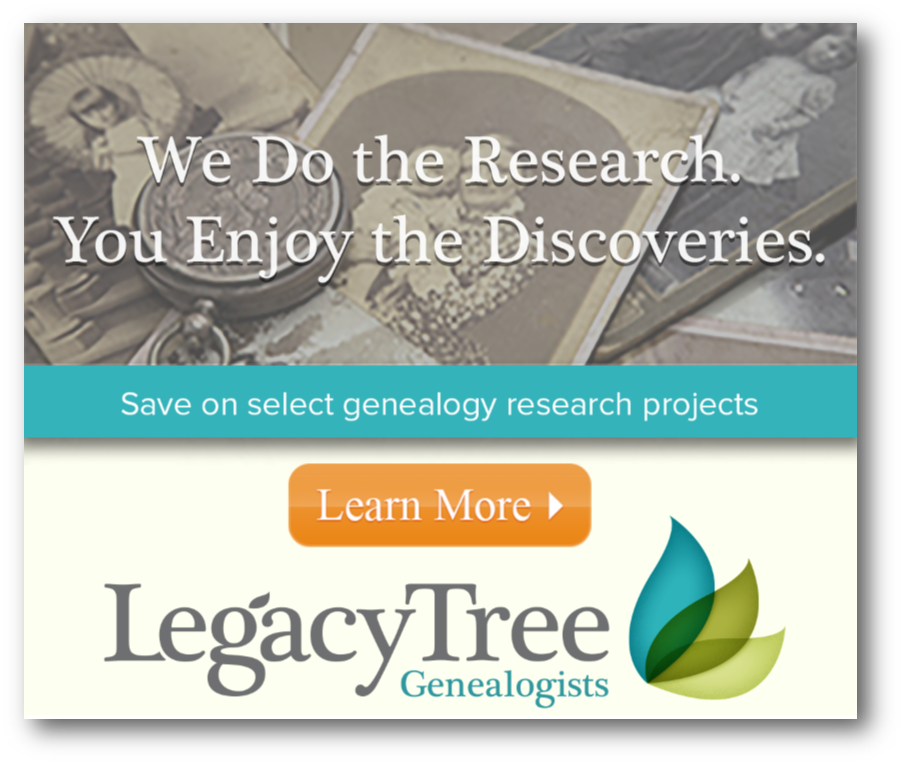Home Archiving for the Genealogist: 5 Ways to Think Like an Archivist
You may be doing some “home archiving” without even realizing it, if you’re the keeper of any family photos, documents, heirlooms, or artifacts. Professional archivist and genealogist Melissa Barker offers these tips for the family historian and keeper of the family archive.

I have always said that “home archiving” is something genealogists do, perhaps without ever calling it that. So family historians can definitely benefit from learning how archivists work. Here are five ways to think like an archivist.
5 Home Archiving Tips for Family Historians
 1. Learn to preserve family artifacts.
1. Learn to preserve family artifacts.
Archivists are always educating themselves on how to preserve certain items that have come to their archives. Genealogists inherit family heirlooms all the time. Learning how to preserve them is thinking like an archivist.
Tip: Preserving an item means keeping it from further deterioration. This may mean putting it in special storage materials, keeping it out of strong light, and storing it in a place that isn’t too hot, cold, or humid. Click here to read an article on humidity and your family archive.
 2. Organize your “collection.”
2. Organize your “collection.”
A very important job for archivists is keeping their records collections organized so they know what they have and can pull them efficiently. Genealogists, as home archivists, would also benefit from keeping their genealogical records organized.
Tip: Get inspired! Click here to catch some tips on organizing your digital photos from Denise Levenick, The Family Curator and author of How to Archive Family Keepsakes: Learn How to Preserve Family Photos, Memorabilia and Genealogy Records.
 3. Store your treasures carefully.
3. Store your treasures carefully.
Archivists are always careful to use special materials such as archival file folders and boxes to put records and artifacts into for preservation. Genealogists should use archival materials to preserve and store their records just like archivists do.
Tip: Click here to read my article on how to archive family history documents. It’s packed with great tips and recommended products to store your items safely.
4. Keep the stories that go with your artifacts.
 Telling the stories of the people that have come before us is also something that archivist try to do with the records they have in their care. Archivists do this by sharing their records collections with the public through displays, exhibits, and open houses. Genealogists should tell their ancestor’s stories by sharing their family histories with their families and passing down their ancestor’s stories to the next generation.
Telling the stories of the people that have come before us is also something that archivist try to do with the records they have in their care. Archivists do this by sharing their records collections with the public through displays, exhibits, and open houses. Genealogists should tell their ancestor’s stories by sharing their family histories with their families and passing down their ancestor’s stories to the next generation.
Tip: Create a meaningful display of artifacts in your own home. Group together items that tell a story, preferably unique, eye-catching items. Add framed copies of documents and photos (keep originals safely tucked away). Click here for some fantastic ideas from Lisa Louise Cooke on sharing your family history with the non-genealogists in your family.
5. Archive your own mementos.
Archivists collect today for tomorrow! Many archivists collect documents and artifacts that are produced today so they can be preserved for tomorrow. They collect items such as the high school graduation program, digitizing the local newspaper, and that local diner menu.
Genealogists do the same thing in their “home archiving” by collecting and preserving a funeral card, digital photographs they took at the grandbaby’s birthday, and the marriage invitation you received for your niece’s wedding.
 Home Archiving, National Archiving: It’s all in the Genealogy Gems Podcast
Home Archiving, National Archiving: It’s all in the Genealogy Gems Podcast
Did you know I’m on Lisa Louise Cooke’s Genealogy Gems Podcast now? I chime in frequently with that “offline” archival perspective that’s so important in our research. Click here to see the list of recent episodes. In Episode 211, publishing this week, I report on a fascinating way you can help make collections from the National Archives more accessible to everyone. Why not listen in? It’s free!
Disclosure: This article contains affiliate links and Genealogy Gems will be compensated if you make a purchase after clicking on these links (at no additional cost to you). Thank you for supporting Genealogy Gems!
Native American Census Rolls Online & More
Enjoy brand new records online this week starting with a new collection of Native American Census Rolls at FamilySearch! Also new are civil registrations for France, half a million new records for Kent County, England, and a new digital archive of Japanese American...New Digitized Historical Newspapers You’ll Want To Read
New digitized historical newspapers now online for Colorado, Georgia, Iowa, Montana and Tennessee. Also the British Military Register, UK Suffragette Newspaper Collection, and papers for Nottingham, South London, Cambridgeshire, Hampshire, Leicestershire and North...Applying to Lineage Societies: Why Hire a Pro to Help You
A professional genealogist can help you apply to lineage societies. Joining is a time-honored way to honor your heritage and document your family history research. But it’s not easy! Here’s why even experienced genealogists may want to hire a professional to help with the process.

Thanks to Legacy Tree Genealogists for supplying this guest blog post.
Applying to lineage societies
Do you have an ancestor who lived in Colonial America when the Revolutionary War was fought, or perhaps earlier in Jamestown, Virginia? Does your ancestry extend back to New England when the Mayflower arrived? If so, there are various lineage societies you could consider joining:
- The National Society of the Sons of the American Revolution (SAR),
- The National Society of the Daughters of the American Revolution (DAR),
- The National Society of the Children of the American Revolution (CAR),
- the General Society of Mayflower Descendants (GSMD),
- the Jamestowne Society,
- Society of Families of the Old Northwest Territory,
- state pioneer societies, ethnic societies, Civil War societies, and many more.
 While each organization has different requirements for their lineage society application, most have the same principles: prove a connection from yourself to the person of interest by use of vital records (where available). Where not available, other documentation that proves family connections can be used. (DAR now also accepts DNA evidence.)
While each organization has different requirements for their lineage society application, most have the same principles: prove a connection from yourself to the person of interest by use of vital records (where available). Where not available, other documentation that proves family connections can be used. (DAR now also accepts DNA evidence.)
You may not know that most societies allow you to “piggy-back” on applications they have previously accepted. Let’s say your second cousin Steve already joined a society based on your common patriot (or pioneer) ancestor, Alexander Smith. You would just need to provide documentation proving your connection to your parents, your relevant parent’s connection to his/her parents, and your relevant grandparent’s connection to your common great-grandparents, who were already mentioned in Steve’s application. You may then be able to reference Steve’s application for the remainder of the lineage going back to Alexander Smith.
Overall, this may sound like a simple process. But it often takes quite a bit of work because the records needed to prove each generational link are not always readily available–and sometimes they just don’t exist at all.
Why get help when applying to lineage societies
Below are five ways that a professional genealogist can help you apply to lineage societies:
1. Help you determine how to apply. As we mentioned, each lineage society has different requirements, so you’ll want to be sure you know what they expect in order to be as efficient as possible in gathering documentation. A professional can help you determine exactly what documentation is required and locate contact information for those with whom you need to work to submit your application.
2. Identify where your research should stop and start. There is no need to reinvent the wheel, as the saying goes. If your lineage ties into one that has already been acceptably documented by another member of the society, you should use it! A professional genealogist can help you identify any previous lineage society applications that have already been approved for your lineage. This single step can save you a lot of time and money.
3. Organize your information. A professional genealogist can work with you to determine what documentation you already have and what you will need to order. They can help you order copies of missing vital records or find acceptable substitutes in archives, libraries, and online.
 4. Conduct in-depth research as needed. Many times, at least one ‘problem’ generation requires in-depth research, circumstantial evidence, and a proof summary in order to make the connection. A well-written proof summary explains how all the circumstantial evidence fits together to support the generational link, and often aids the applicant in obtaining membership when not enough concrete documentation is available (or when it conflicts). This often involves delving into land records, tax lists, probate records, and other more obscure sources to find any and all clues and pieces of information that can be used to tie two generations together. It can be a time-consuming task. A professional genealogist can do this efficiently and thoroughly.
4. Conduct in-depth research as needed. Many times, at least one ‘problem’ generation requires in-depth research, circumstantial evidence, and a proof summary in order to make the connection. A well-written proof summary explains how all the circumstantial evidence fits together to support the generational link, and often aids the applicant in obtaining membership when not enough concrete documentation is available (or when it conflicts). This often involves delving into land records, tax lists, probate records, and other more obscure sources to find any and all clues and pieces of information that can be used to tie two generations together. It can be a time-consuming task. A professional genealogist can do this efficiently and thoroughly.
5. Compile and present all records to the lineage society for admittance. You’ll be the one to present or submit your documentation, but professionals can help you get it all ready so that you’ll be as prepared and organized as possible.
Save time and money when applying to lineage societies
A well-prepared lineage society application often shortens the waiting period to be accepted into a society because it is easier to verify and follows the rules of the society. If an application is poorly prepared, it can take several submissions before acceptance into the society is granted. And of course, the lineage society determines what they will and will not accept as proof, so there’s never a guarantee. They may request additional information, and then you have to go back and keep digging! But since professional genealogists have experience working with the various societies and know what types of documentation are usually accepted, working with a pro can make the application process to a lineage easier, more efficient, and in the end, more rewarding.
 If you have an ancestor in your lineage who may qualify you to join a lineage society, experts at Legacy Tree Genealogists can help you gather your documentation and prepare your application. They are the world’s highest client-rated genealogy research firm. Founded in 2004, the company provides full-service genealogical research for clients worldwide, helping them discover their roots and personal history through records, narratives, and DNA. Based near the world’s largest family history library in downtown Salt Lake City, Utah, Legacy Tree has developed a network of professional researchers and archives around the globe.
If you have an ancestor in your lineage who may qualify you to join a lineage society, experts at Legacy Tree Genealogists can help you gather your documentation and prepare your application. They are the world’s highest client-rated genealogy research firm. Founded in 2004, the company provides full-service genealogical research for clients worldwide, helping them discover their roots and personal history through records, narratives, and DNA. Based near the world’s largest family history library in downtown Salt Lake City, Utah, Legacy Tree has developed a network of professional researchers and archives around the globe.
Contact them today to discuss your options–and your ancestors. EXCLUSIVE OFFER for Genealogy Gems readers! Receive $100 off a 20-hour+ research project from Legacy Tree Genealogists with code GEMS100. Offer good through December 31, 2017.
